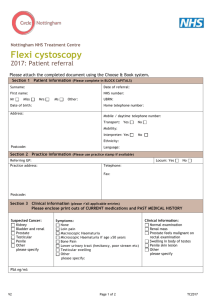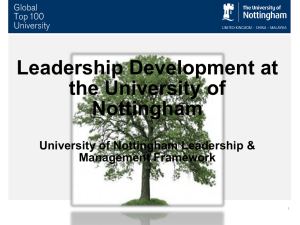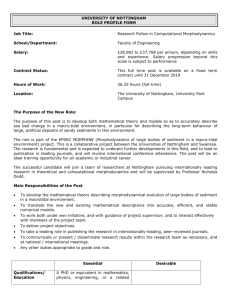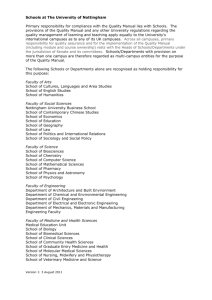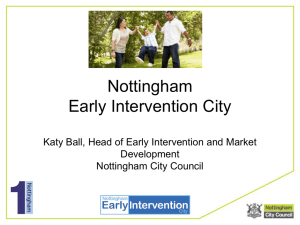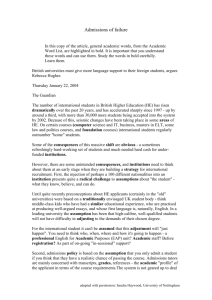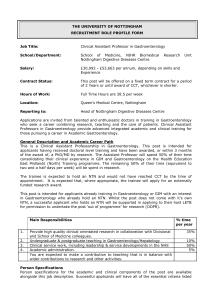Nottingham University - Jobs
advertisement
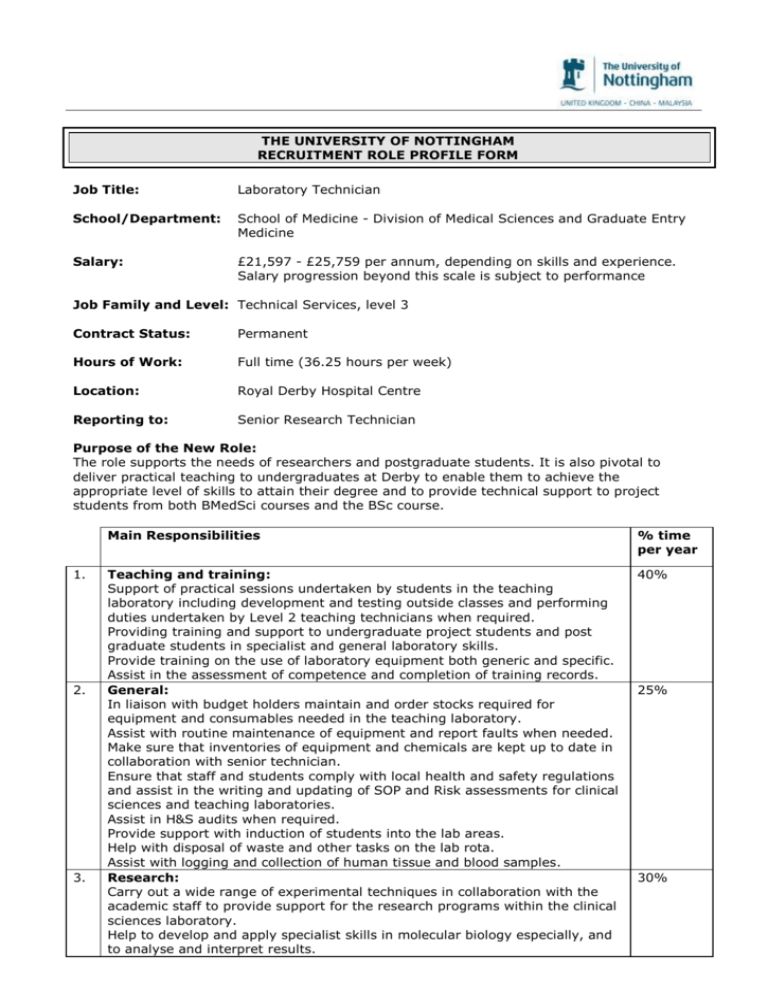
THE UNIVERSITY OF NOTTINGHAM RECRUITMENT ROLE PROFILE FORM Job Title: Laboratory Technician School/Department: School of Medicine - Division of Medical Sciences and Graduate Entry Medicine Salary: £21,597 - £25,759 per annum, depending on skills and experience. Salary progression beyond this scale is subject to performance Job Family and Level: Technical Services, level 3 Contract Status: Permanent Hours of Work: Full time (36.25 hours per week) Location: Royal Derby Hospital Centre Reporting to: Senior Research Technician Purpose of the New Role: The role supports the needs of researchers and postgraduate students. It is also pivotal to deliver practical teaching to undergraduates at Derby to enable them to achieve the appropriate level of skills to attain their degree and to provide technical support to project students from both BMedSci courses and the BSc course. 1. 2. 3. Main Responsibilities % time per year Teaching and training: Support of practical sessions undertaken by students in the teaching laboratory including development and testing outside classes and performing duties undertaken by Level 2 teaching technicians when required. Providing training and support to undergraduate project students and post graduate students in specialist and general laboratory skills. Provide training on the use of laboratory equipment both generic and specific. Assist in the assessment of competence and completion of training records. General: In liaison with budget holders maintain and order stocks required for equipment and consumables needed in the teaching laboratory. Assist with routine maintenance of equipment and report faults when needed. Make sure that inventories of equipment and chemicals are kept up to date in collaboration with senior technician. Ensure that staff and students comply with local health and safety regulations and assist in the writing and updating of SOP and Risk assessments for clinical sciences and teaching laboratories. Assist in H&S audits when required. Provide support with induction of students into the lab areas. Help with disposal of waste and other tasks on the lab rota. Assist with logging and collection of human tissue and blood samples. Research: Carry out a wide range of experimental techniques in collaboration with the academic staff to provide support for the research programs within the clinical sciences laboratory. Help to develop and apply specialist skills in molecular biology especially, and to analyse and interpret results. 40% 25% 30% 4. Contribute by provision of data, to research publications and grant applications. Progress to acquire a depth and breadth of knowledge in a particular area of technical expertise. Provide support to consenting patients and collecting samples and demographic information for projects. Any other duties as required, including support to cover other technicians in their absence. Knowledge, Skills, Qualifications & Experience Essential Qualifications/ Minimum HNC or equivalent in Education relevant subject, or equivalent qualifications plus considerable work experience in relevant role OR Substantial work experience in relevant role Skills/Training Molecular biology skills - RNA extraction, qPCR, cloning, Western blotting, cell culture Excellent oral and written communication skills, including the ability to communicate with clarity on complex information Good customer relation skills Ability to work accurately in order to maintain high standards, with the ability to work effectively under pressure Ability to adopt a methodical approach to work in order to achieve work deadlines Ability to build relationships and collaborate with others internally and externally Experience Substantial work experience in a relevant role in the field of molecular biology Statutory/ Knowledge of H&S requirements and Legal practical appreciation of hazards Satisfactory Enhanced disclosure from the Disclosure and Barring Service 5% Desirable BSc in biological based science Good IT skills ChIP, transfection, good record-keeping Recognised and proven technical expertise in a specialised role Proficiency and proven experience in working in accordance with relevant H&S regulations in a scientific lab, knowledge of HTA rules Decision Making i) taken independently by the role holder Organisation of own activities to meet deadlines on a day to day basis. Completion of documentation and records. Monitoring technical standards, resources and stock control in both labs. Monitoring H&S standards for both staff and students. Advise on costing and ordering of consumables and equipment. ii) taken in collaboration with others Technical details, planning of specific tasks, generation of worksheets and numbers of samples required. Contributing to introduction of new developments and techniques. Requirements for purchasing of consumables and other resources. iii) referred to the appropriate line manager (Averil Warren) by the role holder Financial and budgetary issues. Staff problems related to H&S and non-conformance. Major teaching and/or research issues. Major personal problems. Appendix 1 The University of Nottingham The University of Nottingham is a global-leading, research-intensive university with campuses in the UK, Malaysia and China. Our reputation for world-class research has yielded major scientific breakthroughs such as Nobel-winning MRI techniques, drug discovery, food technologies and engineering solutions for future economic, social and cultural progress. Already ranked among the UK’s elite universities and global polls for research excellence, our reputation for world-class research has been further enhanced with the 2008 results of the Research Assessment Exercise (RAE). In addition to scoring highly in quality rankings covering major disciplines in science, engineering, the social sciences, medicine, business and the arts, it is Nottingham’s increase in research power rankings which demonstrate the impressive volume of excellent research which is carried out. We are now ranked in the Top 7 of all British universities and are one of only two institutions to move into the UK Top 10 since 2001 – an increase of seven places, making us the highest mover of any university. Following the RAE results, 90% of all research at Nottingham has been classified of an ‘international standard’ and 60% as ‘world-leading’ or ‘internationally excellent’. The main University campus is set beside a lake, in an extensive belt of woodland, parks and playing fields. The 330 acre University Park Campus is the focus of life for more than 32,000 students and houses the majority of the University’s academic schools and many of the central Services. The Jubilee campus is situated 2 miles away from the University Park, and provides extra capacity. The University Medical School is situated next to the University Park. Together with the University Hospital, it forms the Queen’s Medical Centre (QMC). University of Nottingham Medical School Nottingham has a strong reputation for both clinical medicine and teaching. As one of the most popular medical schools in the country, it is able to select excellent students and produce and attract good junior doctors. The School of Medicine was formed following Faculty reconfiguration on August 1st 2013. The new School of Medicine comprises the Divisions of Cancer and Stem Cell Sciences, Child Health, Obstetrics and Gynaecology; Clinical Neuroscience; Epidemiology and Public Health; Primary Care; Psychiatry and Applied Psychology; Rehabilitation and Ageing; Medical Sciences and Graduate Entry Medicine; Respiratory Medicine; Rheumatology, Orthopaedics and Dermatology and the Nottingham Digestive Diseases Centre. The School also hosts the Medical Education Centre, the Centre for Interprofessional Education and Learning, the Clinical Research Facility, the Clinical Skills Centre, NIHR design Service East Midlands, Nottingham Clinical Trials Unit, PRIMIS and Medical Imaging Unit. The new School of Medicine brings together in one School staff undertaking research for the benefit of the health of patients. It includes all primary care and hospital-based medical and surgical disciplines, principally in the Queen’s Medical Centre and City Hospital Nottingham Campuses, Royal Derby Hospitals NHS Foundation Trust and also at the University’s main campus and at the King’s Meadow and Jubilee Campuses. Most of our School’s Senior Researchers and Teachers are also clinicians who dedicate 50% of their time to patient care within the Nottingham University Hospitals NHS Trust & Royal Derby Hospitals NHS Trust. This close juxtaposition brings cutting-edge clinical care to our patients and clinical relevance to our research and teaching. We are closely integrated with our full time NHS clinical colleagues, many of whom are themselves leaders in research and teaching and who work closely with the University and this increases the mutual benefit from integration between the University and NHS. Mission: Our mission is to improve human health and quality of life locally, nationally and internationally through outstanding education, research and patient care. Priorities: 1. Teaching and learning, particularly training tomorrow’s doctors and teaching specialised postgraduates 2. Research and research training: We will perform and support the highest quality “big” research which impacts on human health and disease 3. Partnership with the NHS and other healthcare providers 4. Visibility and profile of the School of Medicine: We will do what we do better, and we will tell others about it Ethos and principles: 1. Having people and patients at the heart of all we do: our teaching and learning, our research and our patient care 2. Contribution within the School of Medicine and to society beyond our immediate roles; helpfulness and service 3. Openness and fairness, with particular emphasis on communication (both internal and external) and on equality and diversity among students and staff 4. Personal and group responsibility for all aspects of our work, within a culture of opportunity and reward Our research spans 11 major themes, ranging from cancer to vascular medicine. We work closely with industry and the NHS. Our world-leading research ranges from basic and translational science through to clinical trials, epidemiology, and health services research. Our clear theme is improving human health, underpinning a vibrant postgraduate research training programme leading to PhD or DM. Many of our academics are clinicians, using their expertise to provide cutting edge specialised treatment to NHS patients; reflecting our ethos that patients are at the heart of all we do. Our major research themes are in Cancer and Stem Cells; Child Health, Obstetrics & Gynaecology; Clinical Neurosciences; Digestive Diseases; Epidemiology and Public Health; Mental Health; Musculoskeletal and Dermatology; Primary Care; Rehabilitation and Ageing; Respiratory Medicine and Vascular and Renal Medicine. The School of Medicine trains tomorrow’s doctors on a vibrant undergraduate medical course with a unique intercalated BMedSci, as well in a specialised graduate-entry programme built around clinical problem solving. We teach medicine and related disciplines at both undergraduate and postgraduate level. We have a dedicated clinical academic training programme and are committed to training PhD and doctoral research students and to supporting postdoctoral clinicians and scientists in their research. Professor John Atherton is Dean of the School of Medicine. For further information, please see our website http://www.nottingham.ac.uk/medicine Nottingham Central within the East Midlands, Nottingham is a vibrant and prosperous city with something to offer everyone. It is one of the UK’s leading retail centres and has a huge variety of restaurants, bars and nightclubs which attract people from all over the UK. Culturally, it has good theatres, an arena which attracts both national and international performers and a range of historical interests relating to subjects such as the lace industry, Lord Byron and DH Lawrence. Nottingham is also known for sport, being the home of Trent Bridge Cricket Ground, Nottingham Forest and Notts County Football Clubs, the National Water Sports Centre and the Nottingham Tennis Centre. There is a good network of roads with easy access to the M1 and the A1, a fast frequent rail service to London and other major cities. Nottingham East Midlands Airport is only eighteen miles away. The city is set within a county of outstanding natural beauty which includes Sherwood Forest, Wollaton Park, lively market towns and wonderful historic buildings. Housing is relatively inexpensive and, in addition to the two Universities, there are excellent schools and colleges available. To find out more about Nottingham, use the following links: Nottingham County Council – Tourism http://www.experiencenottinghamshire.com/ University of Nottingham http://www.nottingham.ac.uk Zoopla (Guide to local properties) http://www.zoopla.co.uk/ My Nottingham (information on schools, term dates, school transport etc.) http://www.nottinghamcity.gov.uk/index.aspx?articleid=8524

